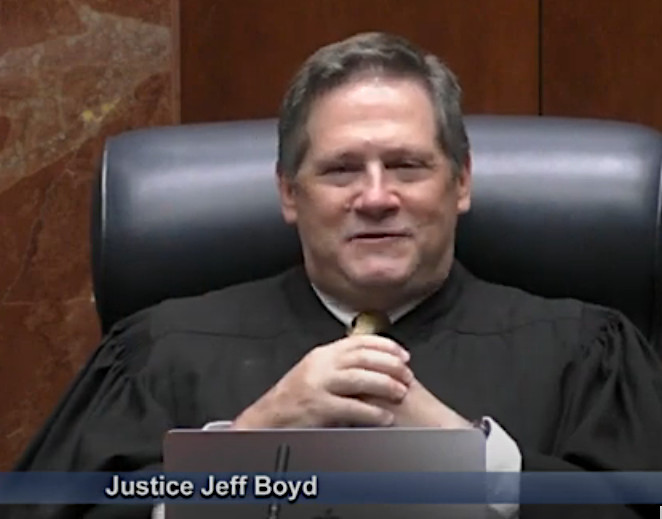New Discipline Petition Filed Against Lawyer Sanctioned for False Statements About Prominent Civil Rights Lawyer
The state bar's Commission for Lawyer Discipline has filed a new case against an Austin lawyer who was sanctioned and suspended from federal court…
May 02, 2018 at 03:18 PM
4 minute read

The state bar's Commission for Lawyer Discipline has filed a new case against an Austin lawyer who was sanctioned and suspended from federal court practice for allegedly making false statements about well-known civil rights lawyer Jim Harrington of Austin.
Omar Weaver Rosales recently won a motion to dismiss in a separate disciplinary case related to letters he sent claiming ADA violations. But this new discipline case is related to conduct that got him sanctioned for nearly $176,000 and suspended from practicing in the U.S. District Court for the Western District of Texas for three years.
In the federal court cases, a series of six Americans with Disabilities Act lawsuits, Rosales in 2016 was sanctioned after a federal magistrate judge found he acted in bad faith by making false statements about Harrington and submitting a fabricated email, and filing a police report and application for an ex parte temporary restraining order against Harrington. That same conduct got Rosales suspended for three years from practicing in the U.S. District Court for the Western District of Texas. He appealed, but the U.S. Court of Appeals for the Fifth Circuit in March affirmed the sanctions and suspension.
The April 27 petition in Commission for Lawyer Discipline v. Rosales, filed in Travis County district court, contains the same allegations that got Rosales in trouble in federal court.
Among other things, the commission claimed the federal court in July 2017 found Rosales took positions that increased costs, delayed a resolution, filed baseless requests for sanctions against Harrington, and didn't comply with court orders to make witnesses available in depositions. Rosales made false and inflammatory statements about Harrington in multiple pleadings because he wanted to embarrass, delay or burden Harrington and disrupt the cases.
For example, Rosales claimed Harrington was racist, anti-semitic and a coward—all ad hominem attacks with no basis, the court ruled. Rosales also alleged Harrington stole and destroyed evidence, threatened his life, used the Texas Civil Rights Project's resources improperly, and tampered with witnesses. All of it was false, the court ruled when sanctioning Rosales.
The discipline petition said Rosales' conduct violated attorney discipline rules that prohibit a lawyer from filing frivolous pleadings, taking positions that increase costs or delay matters unreasonably, using false evidence, falsifying evidence or helping a witness testify falsely, doing things only to embarrass, delaying or burdening someone else, threatening someone with criminal charges just to get an advantage in a civil case, and engaging in dishonesty, fraud, deceit or misrepresentation.
On April 26 visiting judge 292nd District Judge Brandon Birmingham of Dallas County was appointed to the case.
Rosales didn't immediately return calls or emails seeking comment. Gaines West, his attorney, said Rosales is a disabled veteran who represents his own rights and interests in ADA matters and the rights of disabled clients.
“I believe this is retaliation by the bar because their last suit was dismissed with prejudice, because of the TCPA—that's the anti-SLAPP statute. We will be applying the same statute here,” said West, partner in West, Webb, Allbritton & Gentry in College Station.
Harrington, the retired founder of the Texas Civil Rights Project in Austin whom Rosales attacked in the federal court cases, said he hopes Rosales gets disbarred.
“This is a guy who shouldn't be a lawyer. When you manufacture evidence and then lie about it—to me, it's unconscionable, that someone can do that and think he or she can remain a lawyer. That shouldn't happen. This kind of person shouldn't be in the bar,” said Harrington.
A previous discipline case against Rosales, which was dismissed, alleged a different sort of misconduct. The Commission for Lawyer Discipline on Sept. 14, 2017, filed an amended disciplinary petition against Rosales after it received eight separate grievances all claiming Rosales was sending abusive demand letters that alleged the recipients' websites violated the ADA.
Rosales filed a motion to dismiss the case under the Texas Citizens' Participation Act, the state's anti-SLAPP law. He argued he's disabled himself and was communicating how the websites failed, which was an exercise of free speech about a matter of public concern. A judge granted Rosales' motion in February and ordered the Commission for Lawyer Discipline to pay $65,000 for Rosales' attorney fees. The commission is appealing the ruling in the Third Court of Appeals in Austin.
Claire Mock, spokeswoman of the bar's Office of Chief Disciplinary Counsel, which represents the commission, declined to comment.
Angela Morris is a freelance journalist. Follow her on Twitter at @AMorrisReports
This content has been archived. It is available through our partners, LexisNexis® and Bloomberg Law.
To view this content, please continue to their sites.
Not a Lexis Subscriber?
Subscribe Now
Not a Bloomberg Law Subscriber?
Subscribe Now
NOT FOR REPRINT
© 2025 ALM Global, LLC, All Rights Reserved. Request academic re-use from www.copyright.com. All other uses, submit a request to [email protected]. For more information visit Asset & Logo Licensing.
You Might Like
View All
Bathroom Recording Leads to Lawyer's Disbarment: Disciplinary Roundup
6 minute read
Paxton Boasts as Texas Supreme Court Splits on Disciplining First Assistant Attorney General
4 minute read

Austin Appeals Court Rejects Free Speech Defense in Attorney's $2.9M Disgorgement Suit
4 minute readTrending Stories
- 1Deal Watch: Latham, Paul Weiss, Debevoise Land on Year-End Big Deals. Plus, Mixed Messages for 2025 M&A
- 2Bathroom Recording Leads to Lawyer's Disbarment: Disciplinary Roundup
- 3Conn. Supreme Court: Workers' Comp Insurance Cancellations Must Be Unambiguous
- 4To Avoid Conflict, NYAG Hands Probe Into Inmate's Beating Death to Syracuse-Area DA
- 5Scripture-Quoting Employee Sues Company for Supporting LGBTQ Pride
Who Got The Work
Michael G. Bongiorno, Andrew Scott Dulberg and Elizabeth E. Driscoll from Wilmer Cutler Pickering Hale and Dorr have stepped in to represent Symbotic Inc., an A.I.-enabled technology platform that focuses on increasing supply chain efficiency, and other defendants in a pending shareholder derivative lawsuit. The case, filed Oct. 2 in Massachusetts District Court by the Brown Law Firm on behalf of Stephen Austen, accuses certain officers and directors of misleading investors in regard to Symbotic's potential for margin growth by failing to disclose that the company was not equipped to timely deploy its systems or manage expenses through project delays. The case, assigned to U.S. District Judge Nathaniel M. Gorton, is 1:24-cv-12522, Austen v. Cohen et al.
Who Got The Work
Edmund Polubinski and Marie Killmond of Davis Polk & Wardwell have entered appearances for data platform software development company MongoDB and other defendants in a pending shareholder derivative lawsuit. The action, filed Oct. 7 in New York Southern District Court by the Brown Law Firm, accuses the company's directors and/or officers of falsely expressing confidence in the company’s restructuring of its sales incentive plan and downplaying the severity of decreases in its upfront commitments. The case is 1:24-cv-07594, Roy v. Ittycheria et al.
Who Got The Work
Amy O. Bruchs and Kurt F. Ellison of Michael Best & Friedrich have entered appearances for Epic Systems Corp. in a pending employment discrimination lawsuit. The suit was filed Sept. 7 in Wisconsin Western District Court by Levine Eisberner LLC and Siri & Glimstad on behalf of a project manager who claims that he was wrongfully terminated after applying for a religious exemption to the defendant's COVID-19 vaccine mandate. The case, assigned to U.S. Magistrate Judge Anita Marie Boor, is 3:24-cv-00630, Secker, Nathan v. Epic Systems Corporation.
Who Got The Work
David X. Sullivan, Thomas J. Finn and Gregory A. Hall from McCarter & English have entered appearances for Sunrun Installation Services in a pending civil rights lawsuit. The complaint was filed Sept. 4 in Connecticut District Court by attorney Robert M. Berke on behalf of former employee George Edward Steins, who was arrested and charged with employing an unregistered home improvement salesperson. The complaint alleges that had Sunrun informed the Connecticut Department of Consumer Protection that the plaintiff's employment had ended in 2017 and that he no longer held Sunrun's home improvement contractor license, he would not have been hit with charges, which were dismissed in May 2024. The case, assigned to U.S. District Judge Jeffrey A. Meyer, is 3:24-cv-01423, Steins v. Sunrun, Inc. et al.
Who Got The Work
Greenberg Traurig shareholder Joshua L. Raskin has entered an appearance for boohoo.com UK Ltd. in a pending patent infringement lawsuit. The suit, filed Sept. 3 in Texas Eastern District Court by Rozier Hardt McDonough on behalf of Alto Dynamics, asserts five patents related to an online shopping platform. The case, assigned to U.S. District Judge Rodney Gilstrap, is 2:24-cv-00719, Alto Dynamics, LLC v. boohoo.com UK Limited.
Featured Firms
Law Offices of Gary Martin Hays & Associates, P.C.
(470) 294-1674
Law Offices of Mark E. Salomone
(857) 444-6468
Smith & Hassler
(713) 739-1250






